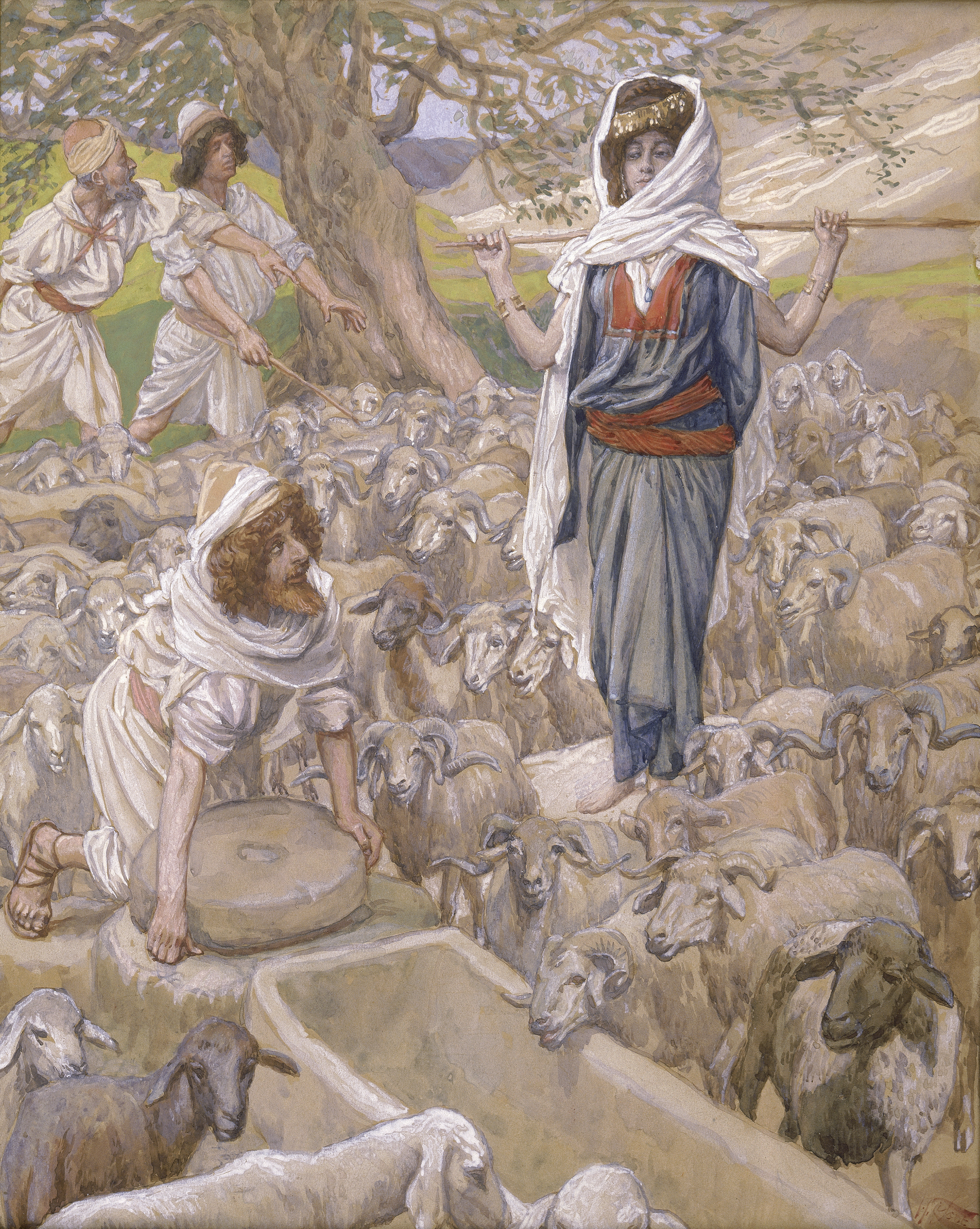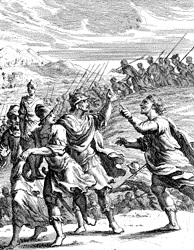|
Teraphim
Teraphim ( he, תְּרָף ''tərāf''; plural: he, תְּרָפִים ''tərāfīm'') is a Hebrew word from the Bible, found only in the plural, of uncertain etymology. Despite being plural, ''Teraphim'' may refer to singular objects, using the Hebrew plural of excellence. The word ''Teraphim'' is explained in classical rabbinical literature as meaning ''disgraceful things''''Jewish Encyclopedia''Teraphim/ref> (dismissed by modern etymologists), and in many English translations of the Bible it is translated as '' idols'', or '' household god(s)'' although its exact meaning is more specific than this, but unknown precisely. Teraphim in the Hebrew Bible Rachel According to Genesis 31, Rachel takes the teraphim belonging to her father Laban when her husband Jacob escapes. She hides them in a saddle bag and sits on them when Laban comes looking for them, and claims that she cannot get up because she is menstruating. From this it can be deduced that they were small, perhaps . Her e ... [...More Info...] [...Related Items...] OR: [Wikipedia] [Google] [Baidu] |
Rachel
Rachel () was a Biblical figure, the favorite of Jacob's two wives, and the mother of Joseph and Benjamin, two of the twelve progenitors of the tribes of Israel. Rachel's father was Laban. Her older sister was Leah, Jacob's first wife. Her aunt Rebecca was Jacob's mother. After Leah conceived again, Rachel was finally blessed with a son, Joseph, who would become Jacob's favorite child. Children Rachel's son Joseph was destined to be the leader of Israel's tribes between exile and nationhood. This role is exemplified in the Biblical story of Joseph, who prepared the way in Egypt for his family's exile there. After Joseph's birth, Jacob decided to return to the land of Canaan with his family. Fearing that Laban would deter him, he fled with his two wives, Leah and Rachel, and twelve children without informing his father-in-law. Laban pursued him and accused him of stealing his idols. Indeed, Rachel had taken her father's idols, hidden them inside her camel's seat cushion, an ... [...More Info...] [...Related Items...] OR: [Wikipedia] [Google] [Baidu] |
Ephod
An ephod ( he, אֵפוֹד ''ʾēfōḏ''; or ) was a type of apron, which according to the Hebrew Bible, was worn by the Jewish high priest the kohen gadol, an artifact and an object to be revered in ancient Israelite culture, and was closely connected with oracular practices and priestly ritual. In the Books of Samuel and Books of Chronicles, David is described as wearing an ephod when dancing in the presence of the Ark of the Covenant (2 Samuel 6:14, 1 Chronicles 15:27) and one is described as standing in the sanctuary at Nob, with a sword behind it (1 Samuel 21:9). In the book of Exodus and in Leviticus one is described as being created for the High Priest to wear as part of his official vestments (Exodus 28:4+, 29:5, 39:2+; Leviticus 8:7). Description In the Bible, in the contexts where it is worn, the ephod is usually described as being linen, but did not constitute complete clothing of any kind, as the Books of Samuel describe.Cheyne and Black, ''Encyclopedia Biblica'' ... [...More Info...] [...Related Items...] OR: [Wikipedia] [Google] [Baidu] |
Hebrew Language
Hebrew (; ; ) is a Northwest Semitic language of the Afroasiatic language family. Historically, it is one of the spoken languages of the Israelites and their longest-surviving descendants, the Jews and Samaritans. It was largely preserved throughout history as the main liturgical language of Judaism (since the Second Temple period) and Samaritanism. Hebrew is the only Canaanite language still spoken today, and serves as the only truly successful example of a dead language that has been revived. It is also one of only two Northwest Semitic languages still in use, with the other being Aramaic. The earliest examples of written Paleo-Hebrew date back to the 10th century BCE. Nearly all of the Hebrew Bible is written in Biblical Hebrew, with much of its present form in the dialect that scholars believe flourished around the 6th century BCE, during the time of the Babylonian captivity. For this reason, Hebrew has been referred to by Jews as '' Lashon Hakodesh'' (, ) since an ... [...More Info...] [...Related Items...] OR: [Wikipedia] [Google] [Baidu] |
Saul
Saul (; he, , ; , ; ) was, according to the Hebrew Bible, the first monarch of the United Kingdom of Israel. His reign, traditionally placed in the late 11th century BCE, supposedly marked the transition of Israel and Judah from a scattered tribal society to organized statehood. The historicity of Saul and the United Kingdom of Israel is not universally accepted, as what is known of both comes from the Hebrew Bible. According to the text, he was anointed as king of the Israelites by Samuel, and reigned from Gibeah. Saul is said to have died by suicide when he "fell on his sword" during a battle with the Philistines at Mount Gilboa, in which three of his sons were also killed. The succession to his throne was contested between Ish-bosheth, his only surviving son, and David, his son-in-law; David ultimately prevailed and assumed kingship over Israel and Judah. Biblical account The biblical accounts of Saul's life are found in the Books of Samuel: House of King Saul According t ... [...More Info...] [...Related Items...] OR: [Wikipedia] [Google] [Baidu] |
Josephus
Flavius Josephus (; grc-gre, Ἰώσηπος, ; 37 – 100) was a first-century Romano-Jewish historian and military leader, best known for ''The Jewish War'', who was born in Jerusalem—then part of Roman Judea—to a father of priestly descent and a mother who claimed royal ancestry. He initially fought against the Romans during the First Jewish–Roman War as head of Jewish forces in Galilee, until surrendering in 67 AD to Roman forces led by Vespasian after the six-week siege of Yodfat. Josephus claimed the Jewish Messianic prophecies that initiated the First Jewish–Roman War made reference to Vespasian becoming Emperor of Rome. In response, Vespasian decided to keep Josephus as a slave and presumably interpreter. After Vespasian became Emperor in 69 AD, he granted Josephus his freedom, at which time Josephus assumed the emperor's family name of Flavius.Simon Claude Mimouni, ''Le Judaïsme ancien du VIe siècle avant notre ère au IIIe siècle de notre ère : Des ... [...More Info...] [...Related Items...] OR: [Wikipedia] [Google] [Baidu] |
Book Of Ezekiel
The Book of Ezekiel is the third of the Latter Prophets in the Tanakh and one of the major prophetic books, following Isaiah and Jeremiah. According to the book itself, it records six visions of the prophet Ezekiel, exiled in Babylon, during the 22 years from 593 to 571 BCE, although it is the product of a long and complex history and does not necessarily preserve the very words of the prophet. The visions, and the book, are structured around three themes: (1) Judgment on Israel (chapters 1–24); (2) Judgment on the nations (chapters 25–32); and (3) Future blessings for Israel (chapters 33–48). Its themes include the concepts of the presence of God, purity, Israel as a divine community, and individual responsibility to God. Its later influence has included the development of mystical and apocalyptic traditions in Second Temple and Judaism and Christianity. Structure Ezekiel has the broad three-fold structure found in a number of the prophetic books: oracles of wo ... [...More Info...] [...Related Items...] OR: [Wikipedia] [Google] [Baidu] |
Book Of Zechariah
The Book of Zechariah, attributed to the Hebrew prophet Zechariah, is included in the Twelve Minor Prophets in the Hebrew Bible. Historical context Zechariah's prophecies took place during the reign of Darius the Great and were contemporary with Haggai in a post- exilic world after the fall of Jerusalem in 587/586 BC. Ezekiel and Jeremiah wrote before the fall of Jerusalem while continuing to prophesy in the early exile period. Scholars believe Ezekiel, with his blending of ceremony and vision, heavily influenced the visionary works of Zechariah 1–8. Zechariah is specific about dating his writing (520–518 BC). During the exile, many Judahites and Benjamites were taken to Babylon, where the prophets told them to make their homes, suggesting they would spend a long period of time there. Eventually freedom did come to many Israelites, when Cyrus the Great overtook the Babylonians in 539 BC. In 538 BC, the famous Edict of Cyrus was released, and ... [...More Info...] [...Related Items...] OR: [Wikipedia] [Google] [Baidu] |
2 Kings
The Book of Kings (, '' Sēfer Məlāḵīm'') is a book in the Hebrew Bible, found as two books (1–2 Kings) in the Old Testament of the Christian Bible. It concludes the Deuteronomistic history, a history of Israel also including the books of Joshua, Judges and Samuel. Biblical commentators believe the Books of Kings were written to provide a theological explanation for the destruction of the Kingdom of Judah by Babylon in c. 586 BCE and to provide a foundation for a return from Babylonian exile.Sweeney, p1/ref> The two books of Kings present a history of ancient Israel and Judah, from the death of King David to the release of Jehoiachin from imprisonment in Babylon—a period of some 400 years (). Scholars tend to treat the books as consisting of a first edition from the late 7th century BCE and of a second and final edition from the mid-6th century BCE.Fretheim, p. 7 Contents The Jerusalem Bible divides the two Books of Kings into eight sections: *1 Kings 1:1� ... [...More Info...] [...Related Items...] OR: [Wikipedia] [Google] [Baidu] |
Josiah
Josiah ( or ) or Yoshiyahu; la, Iosias was the 16th king of Judah (–609 BCE) who, according to the Hebrew Bible, instituted major religious reforms by removing official worship of gods other than Yahweh. Josiah is credited by most biblical scholars with having established or compiled important Hebrew scriptures during the "Deuteronomic reform" which probably occurred during his rule. Josiah became king of the Kingdom of Judah at the age of eight, after the assassination of his father, King Amon. Josiah reigned for 31 years, from 641/640 to 610/609 BCE. Josiah is known only from biblical texts; no reference to him exists in other surviving texts of the period from Egypt or Babylon, and no clear archaeological evidence, such as inscriptions bearing his name, has ever been found. Nevertheless, most scholars believe that he existed historically and that the absence of documents is due to few documents of any sort surviving from this period, and to Jerusalem having been occupied, ... [...More Info...] [...Related Items...] OR: [Wikipedia] [Google] [Baidu] |
Cleromancy
Cleromancy is a form of sortition (casting of lots) in which an outcome is determined by means that normally would be considered random, such as the rolling of dice, but that are sometimes believed to reveal the will of a deity. In classical civilization In ancient Rome fortunes were told through the casting of lots or ''sortes''. In Judaic and Christian tradition Casting of lots is mentioned 47 times in the Bible. Some examples in the Hebrew Bible of the casting of lots as a means of determining God's will: * In the Book of Leviticus , God commanded Moses, "And Aaron shall cast lots upon the two goats; one lot for the , and the other lot for the scapegoat." * According to Numbers , Moses allocated territory to the tribes of Israel according to each tribe's male population and by lot. * IJoshua 7:14 a guilty party ( Achan) is found by lot. * In the Book of Joshua , Joshua says, "Ye shall therefore describe the land into seven parts, and bring the description hither to me, that I ... [...More Info...] [...Related Items...] OR: [Wikipedia] [Google] [Baidu] |
Divination
Divination (from Latin ''divinare'', 'to foresee, to foretell, to predict, to prophesy') is the attempt to gain insight into a question or situation by way of an occultic, standardized process or ritual. Used in various forms throughout history, diviners ascertain their interpretations of how a querent should proceed by reading signs, events, or omens, or through alleged contact or interaction with a supernatural agency. Divination can be seen as a systematic method with which to organize what appears to be disjointed, random facets of existence such that they provide insight into a problem at hand. If a distinction is to be made between divination and fortune-telling, divination has a more formal or ritualistic element and often contains a more social character, usually in a religious context, as seen in traditional African medicine. Fortune-telling, on the other hand, is a more everyday practice for personal purposes. Particular divination methods vary by culture and reli ... [...More Info...] [...Related Items...] OR: [Wikipedia] [Google] [Baidu] |
Micah's Idol
The narrative of Micah's Idol, recounted in the Book of Judges ( chapters 17 and 18), concerns the Tribe of Dan, their conquest of Laish, and the sanctuary that was subsequently created there. Biblical narrative The narrative, as it stands in Judges 17, states that a man named Micah, who lived in the region of the Tribe of Ephraim, possibly at Bethel, had stolen 1100 silver shekels from his mother, but when his mother cursed about it he returned them. The mother then consecrated the money to Yahweh for the purpose of creating a carved image and silver idol, and she gave 200 shekels to a silversmith who made them into a carved image and an idol. These were placed in a shrine in Micah's house, and he made an ephod and teraphim, and installed one of his sons as a priest. A young Levite, from Bethlehem in Judah, who lived near Micah (some translations render the underlying Hebrew term as ''sojourning'', though it literally means ''resident alien'') and was wandering the land, passed ... [...More Info...] [...Related Items...] OR: [Wikipedia] [Google] [Baidu] |











